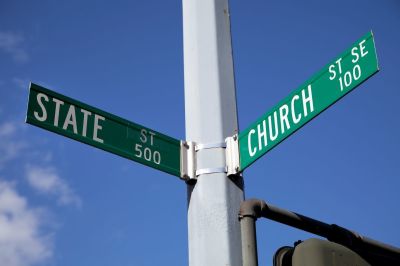Why should churches and church leaders be in politics?

In a previous column, I raised the question of whether churches should be involved in politics. My answer then still stands: Yes, but if churches go into the political arena they should go as churches, not as the religious wing of a political party or candidacy.
However, I must add that churches recognize another fact: It is not only possible that churches will be drawn into politics, but highly probable as the battle for the presidency in the USA gets hotter.
Here's why: Every political system and cause is based on a particular worldview, and worldviews enshrine sets of values. Values are set by whatever a political enterprise deems as transcendent to all other principles and worldviews.
Churches not only give rise to values that comprise worldviews that express and guide political enterprises, policies, and power holders, but the value system constitutes a "holy" authority for judging between political ideologies, campaigns and the style of governance once a particular candidate with his or her own beliefs if elected to office.
Thus Donald Trump tries to put together some form of transcendency in his campaign efforts, and Kamala Harris at some points seeks to display her transcendent values and the worldview that forms her political doctrines.
It is therefore naive to believe it is possible to leave politics outside the great gates and doors of churches.
Sadly, churches that try to stay out of politics can be easily misled. They fall victim to politicians who come asking for the use of the good name of the church, and Church leaders who are misled by political actors who try to learn quickly the lines that may sound good to the ears of hopeful clerics.
There is a positive aspect to this dilemma. Considering the inevitability of engagement with churches, religious leaders must assert themselves and their views about morality, crucial social and cultural issues and party platforms.
The late Billy Graham is an excellent example of this. He built relationships with political leaders who were bound to seek his help, but he had his own transcendent values well set before he interacted with the politicians who wanted his valuable support. Dr. Graham knew what he believed, and did not hesitate to confront political leaders with it. His vision always was ministry, ministering to candidates who sought his help as well as ministry to the nation itself during heated campaigns.
This was a hard road to travel, but Graham saw it as God opening the door of opportunity to minister in the system for the sake of the nation. And it was a bipartisan effort. Graham would meet with John F. Kennedy or Lyndon Johnson as quickly as he would Richard M. Nixon.
The truth is that church leaders have a responsibility to their churches, and also to their broader communities, to be ready when the political candidates come knocking. Pastors, deacons and others need to be able to challenge the politicians with the right questions and concerns. That is, they must play a prophetic role in the political arena and enter that hot place with at their own risk. They will be misunderstood and criticized, but they will play a vital role in helping identify the values that form a political worldview.
This is as much a work of ministry as visiting a sick patient in a hospital.
The nation needs brave and knowledgeable religious leaders in the political process to help form the structures that will determine the quality of governance at all levels.
Wallace B. Henley is a former pastor, daily newspaper editor, White House and Congressional aide. He served 18 years as a teaching pastor at Houston's Second Baptist Church. Henley is author or co-author of more than 25 books, including God and Churchill, co-authored with Sir Winston Churchill's great grandson, Jonathan Sandys. Henley's latest book is Who will rule the coming 'gods'? The looming spiritual crisis of artificial intelligence.



























